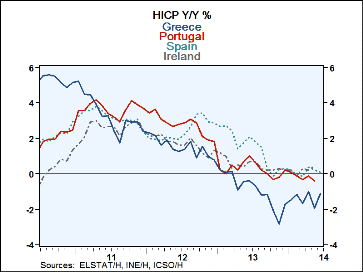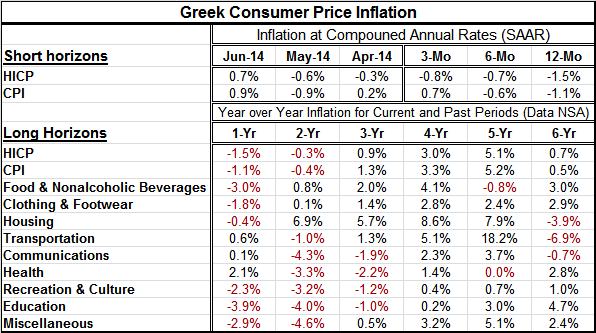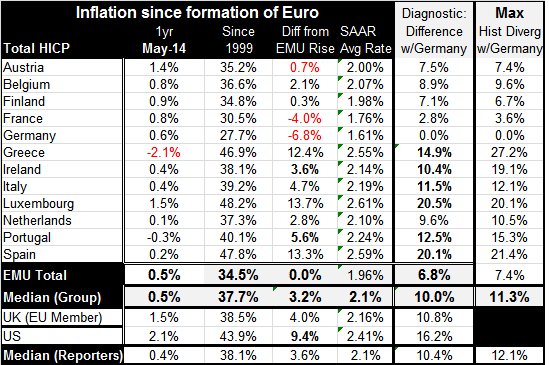 Global| Jul 09 2014
Global| Jul 09 2014Greece Continues to Make Competiveness Gains as Prices Drop
Summary
Greek inflation has slowed its rate of descent in June. In March, prices were falling by 1.5% year-over-year. In April that accelerated to -1.6%; in May, prices were falling by 2.1% year-over-year. In June, the year-over-year decline [...]
 Greek inflation has slowed its rate of descent in June. In March, prices were falling by 1.5% year-over-year. In April that accelerated to -1.6%; in May, prices were falling by 2.1% year-over-year. In June, the year-over-year decline in prices has been cut back to -1.5%.
Greek inflation has slowed its rate of descent in June. In March, prices were falling by 1.5% year-over-year. In April that accelerated to -1.6%; in May, prices were falling by 2.1% year-over-year. In June, the year-over-year decline in prices has been cut back to -1.5%.
Greece's domestic consumer price index shows a similar pattern with prices falling year-over-year, but registers a 12-month decline in June of -1.1%.
The chart shows the price patterns of the countries that have been under pressure with various austerity programs in place in the European Monetary Union. For these countries, inflation rates have come down relatively sharply. However, no country shows a greater deceleration in prices than Greece. Greece's inflation was running just short of 6% in 2010 and now prices are declining faster than in the other troubled borrowers. Progress on inflation, however, also comes at the cost of economic growth. Greece continues to be under pressure and even now, another general strike is being called in Greece to protest various cutbacks.

To demonstrate the extent of Greece's progress, the table below shows inflation performance for the original members of EMU plus Greece. This table shows the recent year-over-year inflation rate for all countries (we use May data because it enlarges the data set since many countries have not yet reported their June figures). We also show the rise in the each HICP inflation rate since the inception of the euro area. We show the difference of each country relative to the rise by the EMU as a whole and we convert this rise to an average annual rate for the period. The next column to the right compares the performance of each country to Germany which has been the low inflation country for this period. And to the right, we show the historic maximum divergence of each of these countries with Germany since EMU was formed. In inspecting this column, you can't help but notice the tremendous progress made on inflation by Greece and Ireland. Each of these countries has cut its price divergence with Germany by nearly 10 percentage points or more from its worst gap. But, of course, this progress is coming at a price and that price has been economic activity. There has been some progress made by Portugal and minor progress made by other countries. The historic median maximum divergence with Germany is 11.3 percentage points, while the current differences 10 percentage points. Those figures that suggest that the progress needed to compress price divergence still have a long way to go. Since the EMU tried to get national price levels right at its inception, the drift of inflation rates across countries since the union was formed represents a divergence in price levels that puts intra-community competition on an uneven playing field.
It's not surprising that the countries with the highest price to divergence with Germany are the ones having the most difficulty in the euro area today. One exception to this is Luxembourg, which is a financial center and therefore does not live and die by its price competitiveness. The other exception is France which has maintained its price level very close to Germany, in fact closer than any other country in the table, but still has developed chronic economic problems because of rigidities and its economy.
Greece is an example of a country that has made a great deal of progress. Its austerity program has reduced the extent of its price to divergence in the community substantially. In fact, the degree of the progress in a short period of time surprises me. Yet, because this progress was bought at such a dear price, Greece, like other countries that have undergone austerity programs, continues to experience pushback from its people who want to see some growth and economic improvement in the wake of all the suffering.
Unfortunately, despite its progress, Greece is still one of the least competitive countries in the euro area. As much progress as Greece has made, it still has a long way to go. As we can see from this situation with France, price competitiveness is not the only thing that a country needs to master in order to put its economy right and to achieve sustainable growth. Greece, however, has made a great deal of price progress and hopefully it will be able to build from this improved base to put its economy back on the right track, a sustainable growth track.

Robert Brusca
AuthorMore in Author Profile »Robert A. Brusca is Chief Economist of Fact and Opinion Economics, a consulting firm he founded in Manhattan. He has been an economist on Wall Street for over 25 years. He has visited central banking and large institutional clients in over 30 countries in his career as an economist. Mr. Brusca was a Divisional Research Chief at the Federal Reserve Bank of NY (Chief of the International Financial markets Division), a Fed Watcher at Irving Trust and Chief Economist at Nikko Securities International. He is widely quoted and appears in various media. Mr. Brusca holds an MA and Ph.D. in economics from Michigan State University and a BA in Economics from the University of Michigan. His research pursues his strong interests in non aligned policy economics as well as international economics. FAO Economics’ research targets investors to assist them in making better investment decisions in stocks, bonds and in a variety of international assets. The company does not manage money and has no conflicts in giving economic advice.
More Economy in Brief
 Global| Feb 05 2026
Global| Feb 05 2026Charts of the Week: Balanced Policy, Resilient Data and AI Narratives
by:Andrew Cates






